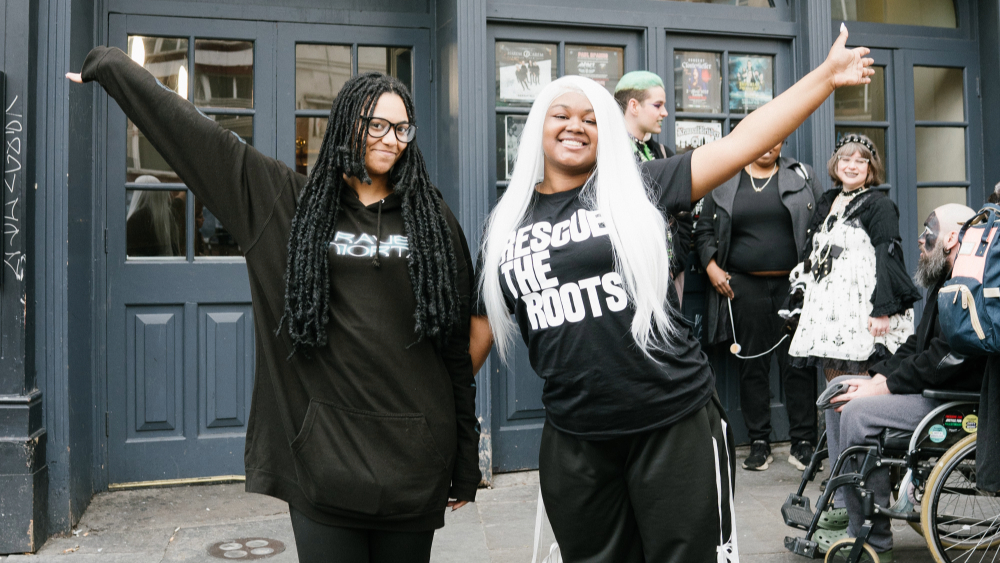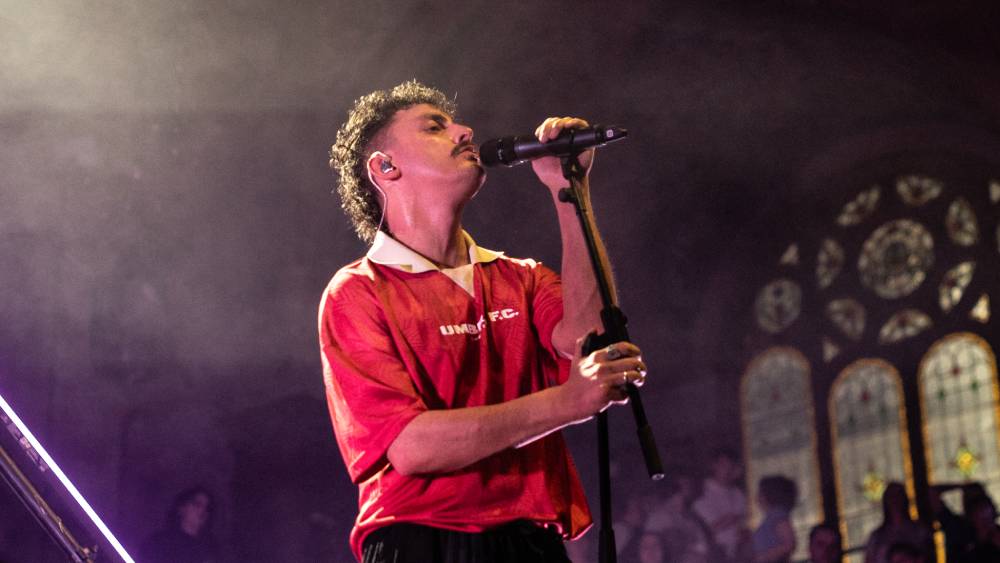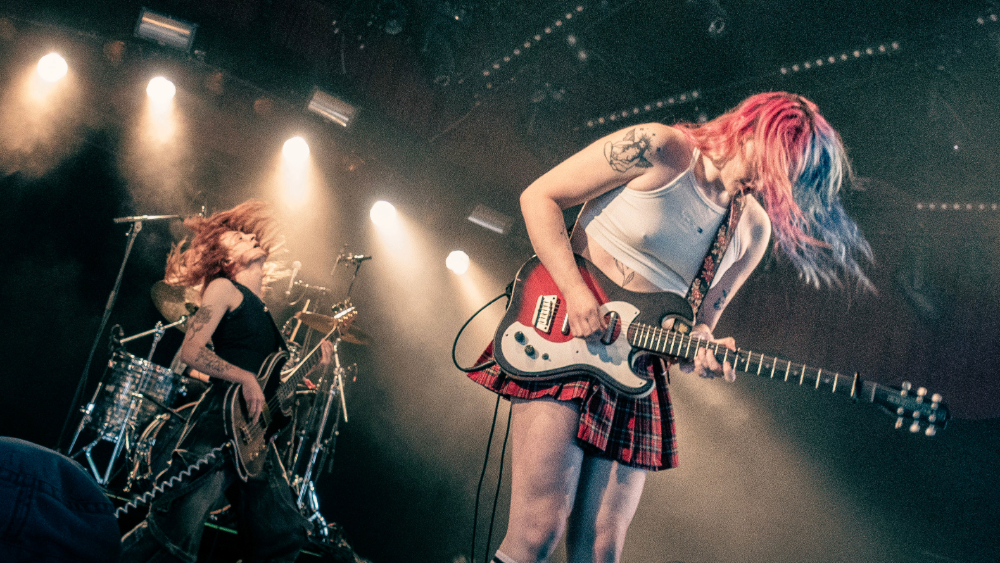Emblematic of the northern city’s ever-flourishing music scene, Manchester’s classical music tradition has undergone a quietly seismic transformation in recent years.
At the vanguard of this change is the acclaimed ensemble (and past PRS Presents headliners) Manchester Collective. Their shapeshifting spirit — which extends across all areas of their live performance, from their lighting, sound design and visual choices to their instruments, amplification and staging — is coupled with a desire to revolutionise perceptions of contemporary classical music, positioning the Collective as one of the UK’s most artistically adventurous outfits.
The Collective’s 2025-26 season of live events begins in London tomorrow (26 September), boasting a plethora of cross-art form collaborations. World premieres by the likes of the Mercury Prize-nominated saxophonist Cassie Kinoshi and future-facing composer Ben Nobuto form a key part of the programme, while a host of choreographers, poets and visual artists have also been enlisted to add their expertise to proceedings. The ambitious series also promises to unpack a range of complex historical moments through music, from the uprising of The Shakers, an 18th-century Protestant sect, to the centuries-old folk tradition of sea shanties.
This Season is the first to be curated by the Collective’s co-artistic directors Rakhi Singh and Jasmin Kent Rodgman. The pair are frequently seeking out connections between different individuals and musical themes, resulting in a multitude of touchstones being placed across each show. The largest of those, though, is unmistakable: Manchester Collective’s deeply thoughtful, worldly vision.
Ahead of their new season, M caught up with Rakhi and Jasmin for the latest edition of our On The Road series to hear about the Collective's commissioning process, their wider artistic view and how integral PRS Foundation funding has been to their mission.
Jasmin: ‘One thing that's really great about Manchester Collective, and working with Rakhi and so many other creative people, is that there are always far more ideas than there is space in any season. I’ve loved being able to bring my own commissions and add them to the collective pit. We've got three or four seasons worth of ideas floating around!’
Rakhi: ‘To be able to refine all of these ideas into a season that balances itself thematically and financially is really important to us. You have to become aware of these things and bring them into consideration when it comes to planning. It’s essentially all about [managing] the relationship between dreaming about what’s possible and what we can actually make possible.’
Jasmin: ‘That’s right. I do think you have to be really open and leave your ego at the door when it comes to working collaboratively. There will obviously be things that you feel really passionate about, but ultimately it’s about putting trust in another person'sinstincts as you build your creative relationship. It's just that natural push and pull, isn't it?
‘I quite enjoy the balance that we both provide with our different interests and backgrounds, as well as the different things that we may find exciting at any given moment — they complement each other. It doesn’t mean that we have more of an eye on one artistic practice than another, it’s about working towards finding a balance.’
'You have to be really open and leave your ego at the door when working collaboratively.' - Jasmin Kent Rodgman
Rakhi: ‘As a collective, we really care about making our shows as whole a human experience as possible. Some concert settings have become incredibly formalised in this day and age, but the wider landscape of which we are part of is quite fluid. The boundaries between different art forms can be quite blurred. There's incredibly exciting, sometimes undefinable work happening within music, but also in dance and theatre.
‘We consider every show as having its own feeling — each one is bespoke. We think about how we want people to feel when they're in the room; how we set out the space; if we talk or not. What’s amazing, too, is that we have more diverse audiences than I grew up playing to.’
Jasmin: ‘We want to make something where those worlds collide and meet. If you think about the architecture of the performance —the lighting, the stage design, the humans and how close or far away you are from Rakhi and the ensemble — to be able to listen to and receive music not just with the artists, but with your fellow audience members, is incredibly moving. That level of intimacy is incredibly important now more so than ever. We're ultra-connected in this day and age, but actually having the opportunity to come together and just be with humans in a room is becoming a rarer thing. We lean quite heavily on that.
‘It's also so exciting to see innovation happening around us. It feels daring and brave to try something new and put that out there to audiences. We were resident artists at Southbank Centre. Last year, they released some research alongside their first Multitudes festival which showed that it's really important to share knowledge among venues and performing artists.
‘Classical music audiences are older. I don't think that's untrue as a statement, but if you look at things like film scores, gaming scores and streaming, younger audiences have a real appetite for what would be defined as classical music. I was shocked when I saw how positive some of the stats were.’
Rakhi: ‘I think as humans, we like to put boxes around things. But I suppose part of the reason this organisation even started was to take some of that genre labelling away. Music is music, sound is sound, human energy is human energy. We believe classical music can appeal to anyone. We’re taking a punt by bringing our work to different places; places where people may not even know what a violin is but can still be moved by it.’
'We believe classical music can appeal to anyone.' - Rakhi Singh
Jasmin: ‘We are expanding as a collective year on year. The funding and support that PRS Foundation has provided us has been exceptional — I think they are one of the linchpins of our industry. They approach supporting us in an open-minded way — there's no sense of, "You must do this, you must do that". They're there to help make the work happen.’
Rakhi: ‘Many of our projects wouldn't have happened without that support. It’s exciting, too, to see a funding organisation so engaged with our work. They attend classical concerts and want to connect with what we are doing. It is so refreshing to see.’
Jasmin: ‘We received Talent Development Network funding for our EXPERIMENTA project, which seeks to uplift and develop new talent. That programme just finished its first year and, as Rakhi said, it would not have happened without PRSF funding. It’s an initiative that is absolutely key to the core activity of what we do.’
Manchester Collective's 2025-26 season kicks off on 26 September at the Southbank Centre in London.
Played live recently? Find out more about how you can earn royalties when you report your setlists to PRS.





